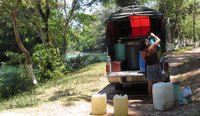Agua: el buen negocio del futuro

A woman fills her truck with containers full of fresh water in the nature reserve of Agua Azul, Chiapas, Mexico.
Querida aqua,
Cayendo lentamente,
Ya no te vayas.
Water is the most common substance on Earth. It covers more than 70 percent of the Earth's surface, and yet only three percent is fresh water. There is enough for all 6 billion of us, but we don’t treat it respectfully. Since rain doesn’t fall evenly on the earth’s surface, some areas are wetter than others, and many areas that do have water pollute it or are unable to distribute it. In Guatemala’s history the country has been covered by water three times, and yet in some villages only a few drops trickle from the faucet. In San Miguel, a town not so far from here, a Canadian mining company used up all the water, and the community has been left with nothing. A recent Prensa Libre article claims that in 20 years all the water in this country will be polluted. Cristian, the founder of the JEM, tells me optimistically that’s it’s not true, but on my way to my workshops I notice—in every town—a small brook inundated with trash. Instead of pure, translucent H2O, a small dribble of dark substance makes its way through the plastic bottles, dirty toilet paper, and who knows what else.
The river Coatán makes its way through this region and into Mexico, bringing with it the rubbish and detritus of one country to another. In Cunlaj, where I have a painting workshop every Wednesday, a whole mountainside leading down to the river is covered in trash. Tacaná’s town hall used it as their dumpsite for years until last spring, when a few international NGOs took notice. There was no clean-up process proposed, and when Hurricane Stan arrived it spread the garbage all over the place, including down into the river. As my students paint pictures of the river during and after Stan, thick dark brown strokes of paint are set apart from the blue sky. Houses, horses, people, whole trees, and piles of garbage float on by.
The organization I work for, JEM, has centered its environmental concerns around water. Their slogan is United for Water, and they use as their logo a drop of water hitting the surface. They see water as the center of the conversation concerning all other environmental topics. In March, three members of the JEM were accepted as participants in the World Water Forum. It took place in Mexico City, a place that used to be an island surrounded by four large lakes but that now has a grave water shortage. (The Spanish, after conquering the city of Tenochtitlan, didn’t know how to maneuver the dam system and drained all four lakes.)
Upon his return, Cristian recounted his experiences. One particular discussion, about whether water should be publicized or privatized, stuck out in his mind. The topic was the most controversial at the Forum, and the delegates tried to make their points in a variety of ways. For example, one banner read, Water, the lucrative business of the future. It wasn’t obvious if the banner was ironic or not. At the end of it all, though, the final person to take the podum said: Why does it matter if it’s public or private? What matters is that people pay the fair price.
Can you imagine? Fair-trade water. Imagine, you, a first-world consumer, buying your water like it was coffee. Instead of Starbucks, there’d be H2Obucks. But here in San Pablo, far from the lavish American life, we feel more connected to the water we receive straight from a nearby mountain spring. And while the tubes break once in a while and we have a wait a day for them to get fixed, it’s nothing like the village up the mountain, where the water pressure is nonexistent. Woman haul water jugs on their heads and donkeys cart large containers filled with the precious substance. Even after potable water systems are installed, sometimes there just isn’t any water.
Here, the balance of my relationship with water has shifted and it has demanded my honor and appreciation. Instead of a daily 10-minute shower, I take a bath of heated water, approximately 8 or 9 gallons, every three days. Instead of a couple loads of laundry a week, I wash my clothes by hand, but only when they’re really dirty, being aware of every container worth of water I splash over my pants and socks. This stuff has changed its relationship to my being. I no longer see it intertwining itself in every moment of my life, constantly running through my fingers. Instead, it is treated cautiously, because one may never know when the faucet might run dry.

4 Comments:
Grandaddy wants to know what Canadian mine? Didn't I give you a book on water or was that Cort?
Brooke,
Good to see you sprouting roots into the air... an interesting article, written well and with honesty. Your last sentence strikes a note for life.
Paul
Después de los previos comentarios tengo verguenza de preguntarte esto, pero ¿en serio te bañas cada tres días?
Tmabién tengo verguenza por todo el agua que siempre uso y desperdicio, la verdad es que cuando sobra es difícil echarla de menos y más aún ahorrarla.
Besitos para ti y para Ian.
Hi Brooke,
Nice writing and good work! I am coming to visit you with the Artcorps crew in May. We will be doing a film about Artcorps. I am very interested in following up with your sentiments of water as revealed through your art and work with the community. I will correspond directly with you soon. I just wanted to publicy voice my respect for your work and prose.
IanK
Post a Comment
<< Home